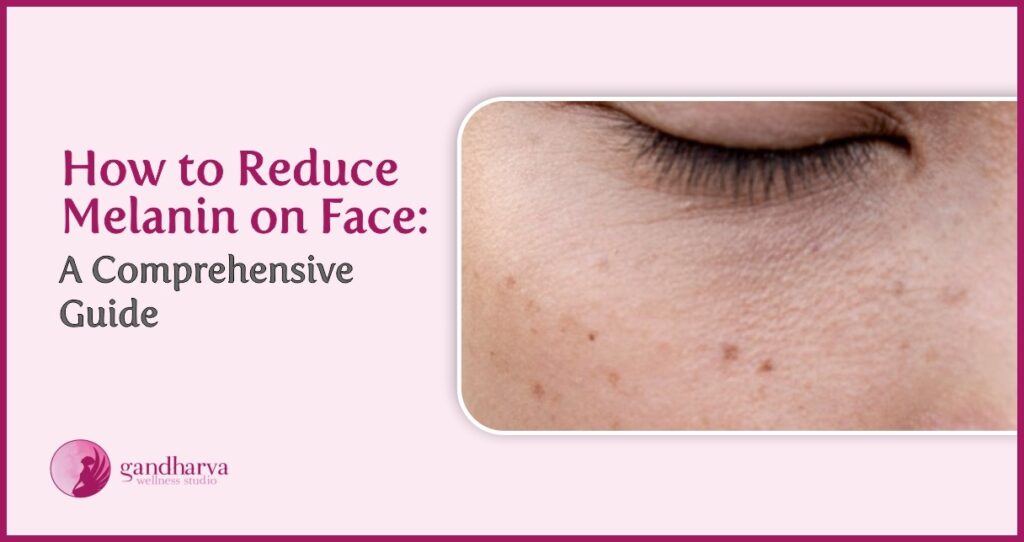
Melanin, the pigment responsible for skin color, can sometimes lead to hyperpigmentation when produced in excess. If you’re looking to reduce melanin on your face, here’s a detailed guide to help you achieve a more even skin tone.
Understanding Melanin and Hyperpigmentation
Melanin is a natural pigment that gives color to your skin, hair, and eyes. Hyperpigmentation occurs when certain areas of the skin become darker than the surrounding areas, often due to increased production of melanin in the skin caused by sun exposure, hormonal changes, or skin injuries.
Causes of Increased Melanin Production
- Sun Exposure: UV rays stimulate the production of melanin as a natural defense mechanism.
- Hormonal Changes: Conditions like melasma are often triggered by hormonal fluctuations.
- Skin Injuries: Post-inflammatory hyperpigmentation can occur after acne, cuts, or burns.
- Medications: Certain drugs can increase melanin production.
Effective Treatments to Reduce Melanin Production
- Topical Treatments:
- Hydroquinone: A skin-lightening agent that decreases melanin production.
- Retinoids: Help in cell turnover and reduce pigmentation.
- Vitamin C: An antioxidant that brightens the skin and reduces dark spots.
- Azelaic Acid: Treats acne and reduces pigmentation.
- These treatments can help control pigmentation for brighter skin.
- Skin Bleaching: Certain products and compounds, such as hydroquinone and natural ingredients like turmeric and lemon juice, can inhibit melanin production, resulting in a lighter and more even skin tone.
- HydraFacial: This treatment hydrates, exfoliates, and clears pores, improving skin tone and reducing pigmentation.
- Professional Treatments:
- Chemical Peels: Exfoliate the skin to reduce pigmentation.
- Laser Therapy: Targets melanin and breaks it down.
- Microdermabrasion: Removes the top layer of skin to reduce dark spots.
- Skin Lightening Treatments: Methods such as laser treatments, application of topical creams, and the use of specific compounds like monobenzyl ether of hydroquinone (monobenzone) can temporarily reduce melanin production. Consulting a doctor is essential for guidance on reducing melanin production and removing melanin deposits.
- Natural Remedies:
- Aloe Vera Gel: Contains aloesin, which inhibits tyrosinase and has shown promise in suppressing melanin production, despite conflicting research results.
- Lemon Juice: Natural bleaching agent that can reduce skin pigmentation due to its high vitamin C content, which reduces tyrosinase activity (use with caution due to its acidic nature).
- Turmeric: Contains curcumin which reduces pigmentation.
Preventive Measures for Limiting Sun Exposure
- Sunscreen: Use broad-spectrum SPF 30 or higher daily. Additionally, limiting sun exposure is crucial to help reduce melanin and improve skin tone.
- Protective Clothing: Wear hats and sunglasses to shield from UV rays. It is important to note that it is not possible to permanently reduce melanin production, as it is determined by genetic factors.
- Avoid Peak Sun Hours: Stay out of the sun between 10 AM and 4 PM. Reduced melanin levels can increase the risk of skin cancer due to less protection from harmful UV rays.
Skincare Routine for Hyperpigmented Skin
- Cleanse: Use a gentle cleanser to remove impurities. For sensitive skin, it is crucial to choose products that do not cause irritation or dryness.
- Exfoliate: Regular exfoliation helps remove dead skin cells. However, be cautious of over-exfoliation as it can lead to skin irritation.
- Treat: Apply serums and creams targeting pigmentation.
- Moisturize: Keep your skin hydrated.
- Protect: Always finish with sunscreen.
Diet and Lifestyle Changes
- Hydration: Drink plenty of water to keep your skin healthy.
- Diet: Include antioxidants in your diet, such as fruits and vegetables.
- Sleep: Ensure adequate sleep for skin repair.
When to Seek Professional Help
If over-the-counter treatments and natural remedies do not work, consult a dermatologist. They can provide personalized treatment plans and advanced therapies to address hyperpigmentation effectively.
FAQs
Sun exposure, hormonal changes, skin injuries, and certain medications.
Aloe vera, lemon juice, and turmeric are popular natural remedies to reduce skin pigmentation.
Hydroquinone, retinoids, vitamin C, and azelaic acid are effective for controlling pigmentation for brighter skin. Additionally, skin bleaching products like hydroquinone can reduce the number of melanocytes, and lemon juice, due to its high vitamin C content, can reduce tyrosinase activity and prevent melanin formation.
Yes, a diet rich in antioxidants can help reduce melanin production.
Results can vary; some treatments may take several weeks to months.
By understanding the causes of hyperpigmentation and exploring various treatment options, you can effectively reduce melanin on your face and achieve a more even skin tone. Always remember to protect your skin from the sun and consult with a dermatologist for personalized advice.
You should also note that we are one of the east India’s most budget friendly laser therapy provider.
